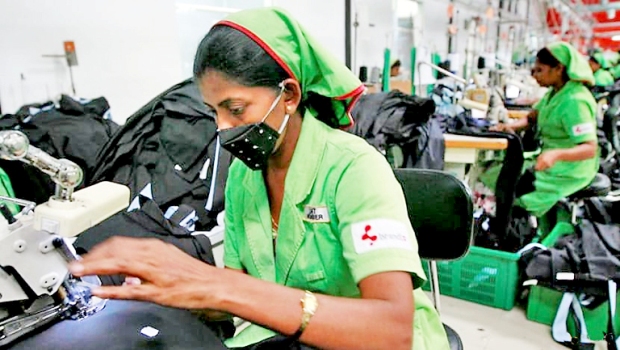Exporters asked to suspend some shipments to US after Trump tariffs
COLOMBO – Some US buyers have asked exporters in Sri Lanka to suspend shipments after a 44% tax was slapped on shipments from the island, apparel industry sources said.
“There are some expectations that President Trump may give an extension from the April 9 deadline,” an apparel industry source said.
“If it is extended the buyers may be able to clear the goods without the tax.”
The request to halt shipments by US buyers is coming just as factories are closing for the traditional New Year holidays, an exporter said.
Sri Lankan export firms usually give extended holidays for the traditional Sinhala-Tamil New Year and use the time to do scheduled maintenance of factories.
On Monday (7), the Dow Jones index briefly picked up amid speculation that there may be a three-month extension of the deadline.
However, stocks resumed their slide after the Whitehouse told the media that speculation of an extension was ‘fake news’.
About 23% of Sri Lanka’s exports go to the US. But in apparel, 1906 million dollars or 40% of the total 4,761 million dollars went to the US.
April is the month when Sri Lanka exporters ship the lowest volumes.
In 2024, Sri Lanka shipped 114 million dollars of apparel compared to 140 to 160 million dollars a month in the rest of the year.
If taxes remain high, Sri Lanka exporters will face higher tariffs than neighbouring Bangladesh and India.
Apparel sector officials have said the industry has thin margins and buyers have an existing network of factories in multiple countries to which orders can be easily transferred.
Sri Lanka is hoping to meet US trade officials this week to submit proposals to cut tariffs and boost imports. Bangladesh has said it will import LNG from the US among other goods to reduce the deficit.
Trump’s taxes appear to be coming mainly from a Sri Lanka-style classical-Mercantilist false belief that trade deficits are ‘bad’.
The US trade and current account deficits come from foreign private investments (due to a good investment framework and stable policies before Trump and freer trade) and government borrowings (foreign central banks, which purchase US securities to build reserves, for example,) which are spent domestically.
The US is the world’s second-largest exporter after China. China beat the US as the world’s top exporter only in 2009, soon after the collapse of the housing bubble. The US also has a services surplus.
However, Trump’s other strategy appears to be to shift some income tax (which destroys domestic savings and capital) into border taxes, in line with the status before 1913.
Under the US Constitution, which guaranteed equal treatment, progressive income tax was illegal as it denied equal treatment to citizens before the law. A constitutional amendment was brought in 1913 to apply the law unequally, which some believe punishes the most productive citizens.
After repeated bouts of ‘monetary accommodation’ and ‘stimulus’ to boost growth by macroeconomists, the US government finances have been driven to the wall.
The US was running budget surpluses for the first time since the collapse of the Bretton Woods system at the end of the Great Moderation period, when Ben Bernanke misled Alan Greenspan to reflate the economy based on a false deflation scare, igniting a housing bubble in the process.
-economynext.com



Comments are closed, but trackbacks and pingbacks are open.